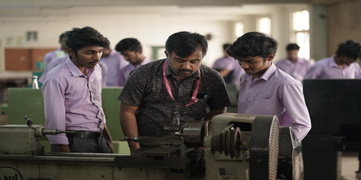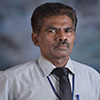Engineering Practices Lab
Engineering Practices Laboratory aims to provide exposure to the students with - hands - on experience on various basic engineering practices in Civil, Mechanical, Electrical and Electronics Engineering. Hands on experience on plumbing and carpentry wood works by using power tools like sawing, planning and cutting machines in civil engineering Practices .In Mechanical Engineering practices students get hands on experiences on sheet metal work forming and bending, model making and so on. Preparation of welded joint and basic machining operations like simple turning and taper turning and also study and demonstration on centrifugal pump air-conditioning system, smithy operations. In Electrical engineering practices students get exposure on residential house wiring using switches, fuse, indicator, lamp and energy meter. In Electronics Engineering Practice study of resistor, colour coding measurement of AC signal parameter and logic gates is done. The major equipments in this lab are Victory Brand Lathe and Victory Brand Lathe Heavy duty for machining process.
Manufacturing Technology Lab
This laboratory consists of following Major equipments 15 Lathes, 2 shapers,2 Horizontal milling machines, Vertical Milling machines, Turret Lathe, Capstan Lathe, Surface grinding machine, Cylindrical grinding machine, Centre-less grinder, Slotting machine, Radial and Pillar grinding machine, Gear hobbing machine, Gear shaper, Planning machine, Lathe and Milling tool dynamometer and Tool and cutter grinder
Thermal Engineering Lab
The Thermal Engineering laboratory at SRIT is to provide the students with an active learning of Internal combustion engines,Compressors,Heat Transfer equipments,Refrigeration and air conditioning equipments , Steam turbines and cooling towers.The laboratory is fully equipped with different types of IC engines like high speed and low speed petrol and diesel engine with mechanical, electrical and hydraulic loading arrangement, Two stage air compressors, flash point &fire point apparatus , Saybolt viscometer, Cut section models of two stroke and four stroke engines are also available. The Steam turbine is equipped with oil fired (Thermal) boiler, De Laval type impulse turbine Test rig (1kW) . This ensures to perform load & efficiency tests. Heat transfer laboratory have conduction, convection, radiation equipments, and emissivity measurement instruments. One tonnage of refrigeration equipments with refrigerants are R134A and Hydrocarbon are available.Psychrometric properties to measure the air-conditioning system is also available.
Dynamics Lab
The apparatus basically consists of a steel shaft mounted in bell bearings in a stiff rectangular main frame. A set of six blocks of different weights is provided and may be clamped in any position on the shaft, and also be easily detached from the shaft. A disc carrying a circular protractor scale is fitted to one side of the rectangular frame. Shaft carries a disc and rim of this disc is grooved to take a light cord provided with two cylindrical metal containers of exactly the same weight. A scale is fitted to the lower member of the main frame and when used in conjunction with the circular protractor scale, allows the exact longitudinal and angular position of each adjustable block to be determined. The shaft is driven by a 230 volts single phase 50 cycles electric motor, mounted under the main frame, through a belt. For static balancing of individual weights the main frame is suspended to the supported frame by chains and in this position the motor driving belt is removed. For dynamic balancing of the rotating mass system the main frame is suspended from the support frame by two short links such that the main frame and the supporting frame are in the same plane.The exciter unit to D.C variable speed motor. RPM of motor can be varied with the speed control unit. Speed of rotation can known from the RPM indicator on the control panel. It is necessary to connect damper unit to the exciter. Amplitude of vibration can be recorded on strip chart recorder.
CAD/CAM Lab
CAM lab is equipped with CNC Turning and Milling centers which are capable of doing automatic operations such as turning, Milling, drilling etc., interfaced with their XLTurn and XL Mill software. CAD lab is equipped with latest software like Solidworks, CATIA which are mainly used for creation of both 2-D and 3-D models. FEMAP NASTRAN software is used for analysis such as static analysis, thermal analysis etc., FANUC NC Guide software is intended for simulation of tool path in CNC programming and Edge CAM software is used for generating profile path of CNC operations. Lab VIEW software is used for simulation of circuits and mechanisms such as Refrigeration cycles, CAM and Follower mechanism, Logic Gates etc., This CAD/CAM lab is equipped with latest E printer which is capable of printing up to A3 size and Cloud/E- printing can also be carried out.
Metrology and Measurements Lab
The Metrology laboratory at SRIT is to provide the students with an active learning environment for the measurement technologies used in production engineering field. Students use the laboratory to collect and analyze measurement data, evaluate measurement methodologies, and learn the capabilities and limitations of measurement technologies. Co-ordinate Measuring Machines (CMM) is a computer controlled CMM consisting of a contact probe and a means of positioning the probe in three dimensional space relative to the surface of a work part in order to obtain the data concerning the part size and geometry. This machine is used to Dimensional measurement, Profile measurement, Angularity or orientation, Depth mapping, and Digitizing or imaging. An autocollimator is an optical instrument that is used to measure small angles with very high sensitivity. We can also use autocollimator to verify the accuracy of a rotary table, comparison of work angle with standard angle block, verification straightness of movement along machined rails and determine flatness of surface plates. Tool Maker’s Microscope is used for measurement of parts of complex figure profiles of external threads, tool templates and gauges.
Mechatronics Lab
The Mechatronics Lab provides state - of - the - art facilities and experimental setups to learn and enjoy the field of mechatronics. Modern society depends on mechatronic-based systems for modern conveniences. Mechatronics Lab is equipped with Hydraulic and Pneumatic Simulation Software it enables the user to design hydraulic and pneumatic circuits and to obtain both quantitative and qualitative results rapidly and accurately. Electro Pneumatic with PLC is successfully used in many areas of industrial automation. Production, assembly and packaging systems worldwide are driven by Electro-pneumatic control systems. A Programmable Logic Controller can be conveniently used to obtain the out puts as per the required logic, time delay and sequential operation. Finally the output signals are supplied to the solenoids activating the final control valves which controls the movement of various cylinders. The greatest advantage of electro pneumatics is the integration of various types of proximity sensors [electrical] and PLC for very effective control. Servo controller using open/closed loop system analyze, design and optimize complex systems which consists of highly integrated coordination of mechanical, electrical, chemical or pneumatic elements. Process Control Trainer (Flow/Temp/Pressure) The Pressure, Flow, Level, and Temperature Process Training Systems introduce students to a wide range of industrial processes, as well as to their instruments and control devices.
 The Department of Mechanical Engineering was established in the academic year 2005-06 which enrolled 60 students.
The department is accredited by NBA from the July 2014 onwards, and is headed by Dr.B. Chokkalingam who has vast experience in academics.
The department has a group of 12 well qualified and experienced Professors and dynamic young staff who hold their master degrees in their are ao finterest from renowned institutions.
The staff have published papers in their research domains.
The Department of Mechanical Engineering was established in the academic year 2005-06 which enrolled 60 students.
The department is accredited by NBA from the July 2014 onwards, and is headed by Dr.B. Chokkalingam who has vast experience in academics.
The department has a group of 12 well qualified and experienced Professors and dynamic young staff who hold their master degrees in their are ao finterest from renowned institutions.
The staff have published papers in their research domains. 